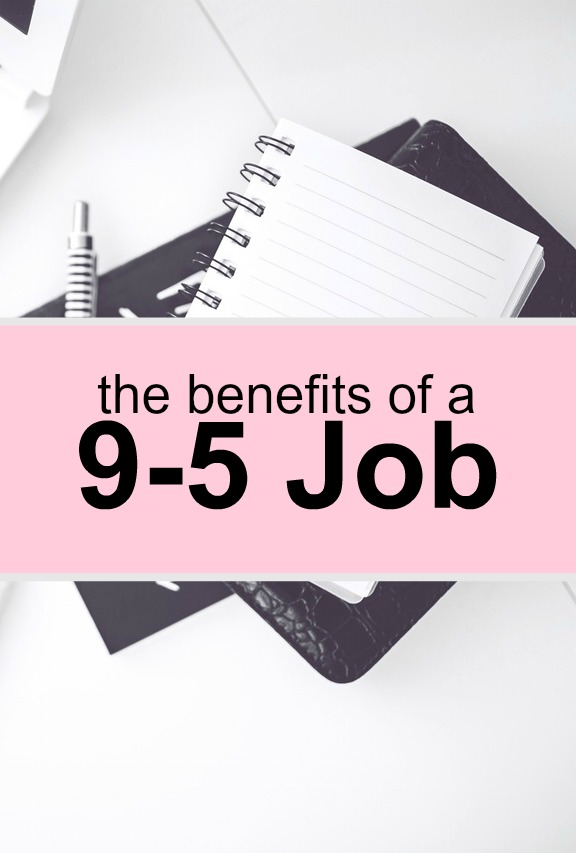I’ve often talked about my love for self-employment and the opportunities I’ve had since making the transition to working for myself. But just because self-employment was the best option for me doesn’t mean that I dislike 9-5 jobs in their entirety.
That’s actually pretty far from the truth.
Regular employment can be wonderful and comes with its own set of pros and cons. There’s definitely been a growing trend for people to leap into entrepreneurship but that’s not always the best idea – especially if you have a day job that you enjoy and that pays fairly.
Here are the 9-5 job benefits you might miss if you become self-employed.
Steady Paycheck
Can I start with the obvious? One of the biggest 9-5 job benefits is that you’re guaranteed a paycheck each and every week.
This isn’t the norm with self-employment, especially when you’re just starting out. It can take a while to develop a marketing strategy that helps you get new contracts consistently, so your income will probably fluctuate for the first few months or even years.
That’s why it’s usually best to keep your day job and work on your business at night and on weekends. You can use the disposable income from your 9-5 job to invest in yourself and buy the tools and education you need to be successful as an entrepreneur.
Knowing that you have your salary to fall back on will also enable you to take more risks in your business, which could pay off. You won’t have to undersell yourself and take low-paying gigs just to pay the bills, so you’ll be able to build a sustainable, profitable business from the get-go.
Having a steady and predictable paycheck to cover your expenses until your business can sustain you is perhaps the greatest benefit of a 9-5.
Social Interaction
One of the biggest hurdles I’ve faced in self-employment is isolation. While this may not be a problem for everyone, I didn’t realize how much I enjoyed the daily social interaction with co-workers until I no longer had it.
If you like the people you work with and enjoy your office’s culture, your job can give you a feeling of community you don’t get as a freelancer. After all, there are no company picnics or office Christmas parties when you work by yourself.
Although you can meet other entrepreneurs by joining a networking group or co-working space, it can be harder to form a connection because you don’t see them every day.
Building up a professional network can reduce some of the loneliness you might feel as a freelancer. However, it can’t totally replace those in-person relationships you had with your co-workers at your 9-5 job.
Mentorship
Another 9-5 job benefit is that it’s easier to find a mentor. About half of all workers say they have a mentor at work. They report being more satisfied with their jobs, salaries, and career advancement opportunities than their peers who don’t have anyone in their corner.
Getting advice and support from someone who’s further along in their career than you is invaluable. But it’s often harder to find someone who’s willing to show you the ropes when you’re an entrepreneur. As an office worker, you get the chance to learn from all of the skilled professionals around you every day—so don’t squander it.
Benefits
When you work for yourself you’re responsible for all benefits including creating your own retirement accounts, covering your own health insurance, and even paying more Social Security and Medicare taxes.
These benefits can cost thousands of dollars each month if you’re paying for them yourself. It’s estimated that you need to earn 1.3X more than your current salary to replace all of the 9-5 job benefits like 401K matching and life insurance.
So until you can command a high enough hourly rate to make up for these employee perks, you should probably keep your day job.
Paid Time Off
Another often overlooked benefit of a day job is paid time off. As a self-employed person, it can be hard to be turn work off. And if you want to take a vacation, you either need to work far ahead or not get paid.
Working a regular day job can allow you to take time off to rest and recharge while still bringing in a paycheck. This is a huge perk considering that 92% of freelancers can’t afford to take a non-working vacation.
Work-Life Balance
If you’re an entrepreneur, completely unplugging and removing your thoughts from work is a huge challenge. At my last day job it was easier for me to turn off “work mode” when I got home. When work is done in your home it’s not that simple.
It’s harder to create separation between your work and home life when your office is right down the hallway from where you relax, so they often bleed into each other. Freelancers can try to regain some work-life balance by taking advantage of local co-working spaces and powering down their devices at a certain time each night.
While I would never discourage anyone from taking a leap into self-employment, I think it’s good to take a look at both sides of the spectrum. There are just as many benefits of working a regular day job as there are being an entrepreneur.
At the end of the day, all that matters is that you’re doing the right thing for yourself.
Read More
Want to Make Money as A Freelancer? Here’s All You Need to Know
Why I Decided to Leave My Job and Start My Own Company
Side Hustle vs Second Job: What’s the Difference?

Vicky Monroe is a freelance personal finance and lifestyle writer. When she’s not busy writing about her favorite money saving hacks or tinkering with her budget spreadsheets, she likes to travel, garden, and cook healthy vegetarian meals.
